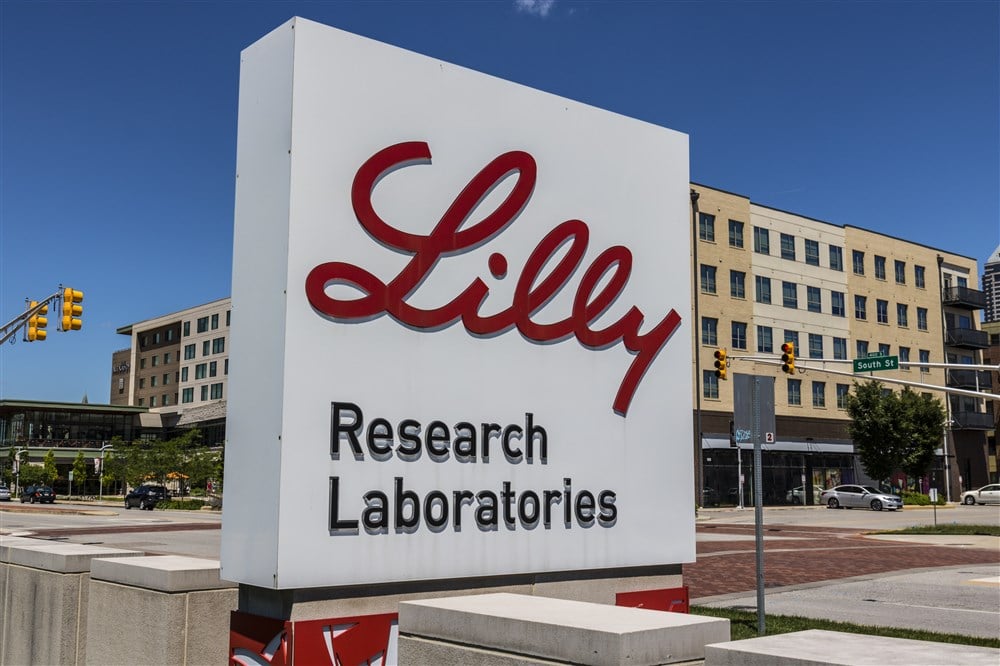
Eli Lilly & Co. (NYSE: LLY) reversed lower on November 9. This came after LLY stock advanced 3.20% after the company got regulators' OK for its weight-loss drug Zepbound.
In clinical trials, the drug helped people lose as much as 52 pounds within a 16-month timeframe.
Zepbound is based on tirzepatide, the main ingredient in Lilly's successful diabetes treatment, Mounjaro.
Zepbound joins Novo Nordisk A/S (NYSE: NVO) as pharmaceutical stocks with medications in the popular and fast-growing weight-loss space. Novo Nordisk's Ozempic and Wegovy have been key drivers behind the company's rapid revenue increases in the past four quarters.
Ozempic treats type 2 diabetes and major cardiovascular conditions, while Wegovy is used for weight loss.
Novo Nordisk's Wegovy crushing sales forecasts
When Novo Nordisk reported second-quarter results on November 2, the stock gapped higher on news that Wegovy sales climbed by an incredible 734% to around $1.38 billion, trouncing expectations.
Ozempic sales were up 46% to about $3.31 billion. That's a strong number, but it missed analysts' views. However, the company remains bullish about the prospects for Ozempic.
Wegovy sales climbed more than eightfold, rocketing 734% to about $1.38 billion, based on today's exchange rates. That easily beat expectations for about $1.09 billion, according to FactSet. Meanwhile, Ozempic sales grew 46% to roughly $3.31 billion but missed views for $3.44 billion.
Together, Wegovy and Ozempic accounted for 52% of Novo Nordisk's revenue in the first nine months of this year, up from 36% a year ago.
Zepbound available in U.S. this year
You can see why Lilly was eager to get the regulatory OK for Zepbound. In its announcement of the news, Lilly said Zepbound is expected to be available in the U.S. by the end of the year. The six-dose regiment will have a list price of $1,059.87.
The company added that this price tag "does not reflect the typical out-of-pocket cost to patients given insurance coverage and discounts. Lilly is putting a commercial savings card program in place that will help people who may benefit from Zepbound better access it."
Some insurance companies don't cover weight-loss treatments, meaning Zepbound may still be too pricey for many patients.
Even so, analysts have high hopes for the new drug. In October, Citigroup's Andrew Baum said he is forecasting sales of $37 billion for Zepbound and $22 billion for Lilly's Mounjaro.
Citigroup boosted its price target on Lilly stock on October 23, increasing it to $675 from $525.
Eli Lilly chart shows 50-day support
MarketBeat's Eli Lilly analyst forecasts show a consensus view of "moderate buy" with a price target of $557. That's a 14% downside, which means it's worth taking a look at the Eli Lilly chart.
Eli Lilly stock rallied to a high of $629.97 on October 13 before retreating. The stock fell below its 50-day average but rebounded to find support at that line.
Analysts are forecasting Lilly earnings of $12.29 per share in 2024, which would be an increase of 86% over the $6.61 per share expected this year.
"While the firm remains very well-positioned for growth with its cardiometabolic drug Mounjaro, we believe the market is overly optimistic about the company's outlook," wrote Morningstar analyst Damien Conover on November 2 after Lilly's most recent quarterly report.
Keep in mind that Conover and other analysts fully expected the FDA approval for Zepbound, so that's not a development likely to change any analysts' modeling.
Side effects, costs, could inhibit uptake
If there's anything that could hinder sales, it could be some of the nasty side effects of these drugs. According to the FDA, Zepbound and other similar treatments have a risk of gastrointestinal issues, including nausea, vomiting, stomach pain, constipation and diarrhea.
Cost may be another factor that inhibits uptake.
A July report from pharmacy benefits management company Prime Therapeutics found that 68% of individuals "who newly started glucagon-like peptide-1 agonist (GLP-1a) drugs for weight loss were no longer taking the drug after one year. The data also show a substantial increase in health care cost in the first year among those who also started the drugs."














